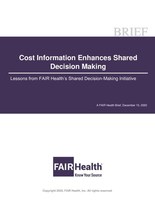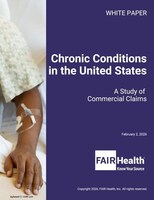
Cost Information Increases Utility of Decision Aids for Shared Decision Making
FAIR Health Brief Reveals Lessons Learned from Palliative Care Shared Decision-Making Initiative
NEW YORK, Dec. 10, 2020 /PRNewswire/ -- Cost information, when paired with information about clinical treatment options, greatly enhances the value of shared decision making, reported a FAIR Health brief released today. This was among the lessons learned from a FAIR Health initiative presenting patient decision aids for shared decision making in palliative care scenarios, as described in the brief Cost Information Enhances Shared Decision Making: Lessons from FAIR Health's Shared Decision-Making Initiative.
Shared decision making means the discussion between patients/caregivers and healthcare providers regarding various treatment options, guided by evidence-based strategies and patient decision aids. Shared decision making shows promise for reducing unnecessary healthcare spending and costs, and for improving decision making without adverse effects on clinical outcomes. But in the past, the utility of shared decision-making tools, or decision aids, has been limited by the absence of cost data to complement the clinical information.
As part of a pilot generously funded by The New York Community Trust, FAIR Health launched a new shared decision-making feature with cost information in March 2020. The feature combines cost data from FAIR Health with decision aids for three palliative care scenarios:
- Kidney dialysis for patients with kidney failure (whether to continue or stop);
- Nutrition options when swallowing is difficult; and
- Breathing assistance (whether to continue or stop).
Following the successful implementation of this initiative, FAIR Health compiled its findings from the program in a brief so that a range of stakeholders—clinicians, payors, policy makers and the like—can use these learnings in future shared decision-making initiatives. Among the lessons learned were:
- Conversations surrounding cost in palliative care are part of decision making;
- Shared decision-making tools are useful and valuable for providers and patients alike;
- There is an appetite for additional shared decision-making tools for other medical conditions;
- Provider acceptance of these tools is a critical pathway for promoting shared decision making;
- There is a need to improve awareness of shared decision making and patient decision aids among providers; and
- Palliative care conversations require special sensitivity.
As noted, the program findings confirm the utility of cost information in shared decision making. Notably, conversations about clinical treatment options and costs present an opportunity to empower healthcare consumers and patients to make critical healthcare decisions with their clinicians that not only affect their health but their finances.
FAIR Health collaborated with organizations and professionals, such as Dr. Glyn Elwyn, BA, MD, MSc, PhD, professor at the Geisel School of Medicine at Dartmouth College, and Dr. Diane Meier, Director of the Center to Advance Palliative Care, to create, evaluate and promote awareness of this resource.
The findings from this initiative are being used to inform FAIR Health's currently active project, generously funded by the Fan Fox and Leslie R. Samuels Foundation, to create a companion educational site for healthcare providers. This new initiative contemplates the development and dissemination of a provider-facing, online educational portal that will promote the use of the shared decision-making tools to New York City-based providers serving older adults with serious illnesses. FAIR Health will launch the new portal in March 2021.
FAIR Health President Robin Gelburd said, "Based on the insights FAIR Health collected, we observed that providers and consumers alike deemed the shared decision-making tools useful and valuable to their conversations in palliative care scenarios. We hope to expand our efforts in shared decision making to other preference-sensitive conditions through future collaborations."
Diane E. Meier, MD, Director of the Center to Advance Palliative Care, Icahn School of Medicine at Mount Sinai, stated: "Having witnessed the need for clear and accurate information when making critical health decisions during chronic and serious illness, I am heartened by FAIR Health's effort to promote shared decision making for patients and caregivers when they most need clarity and guidance."
To access the brief, click here.
Follow us on Twitter @FAIRHealth
About FAIR Health
FAIR Health is a national, independent nonprofit organization that qualifies as a public charity under section 501(c)(3) of the tax code. It is dedicated to bringing transparency to healthcare costs and health insurance information through data products, consumer resources and health systems research support. FAIR Health possesses the nation's largest collection of private healthcare claims data, which includes over 32 billion claim records and is growing at a rate of over 2 billion claim records a year. FAIR Health licenses its privately billed data and data products—including benchmark modules, data visualizations, custom analytics and market indices—to commercial insurers and self-insurers, employers, providers, hospitals and healthcare systems, government agencies, researchers and others. Certified by the Centers for Medicare & Medicaid Services (CMS) as a national Qualified Entity, FAIR Health also receives data representing the experience of all individuals enrolled in traditional Medicare Parts A, B and D; FAIR Health includes among the private claims data in its database, data on Medicare Advantage enrollees. FAIR Health can produce insightful analytic reports and data products based on combined Medicare and commercial claims data for government, providers, payors and other authorized users. FAIR Health's systems for processing and storing protected health information have earned HITRUST CSF certification and achieved AICPA SOC 2 compliance by meeting the rigorous data security requirements of these standards. As a testament to the reliability and objectivity of FAIR Health data, the data have been incorporated in statutes and regulations around the country and designated as the official, neutral data source for a variety of state health programs, including workers' compensation and personal injury protection (PIP) programs. FAIR Health data serve as an official reference point in support of certain state balance billing laws that protect consumers against bills for surprise out-of-network and emergency services. FAIR Health also uses its database to power a free consumer website available in English and Spanish and an English/Spanish mobile app, which enable consumers to estimate and plan for their healthcare expenditures and offer a rich educational platform on health insurance. The website has been honored by the White House Summit on Smart Disclosure, the Agency for Healthcare Research and Quality (AHRQ), URAC, the eHealthcare Leadership Awards, appPicker, Employee Benefit News and Kiplinger's Personal Finance. FAIR Health also is named a top resource for patients in Dr. Marty Makary's book The Price We Pay: What Broke American Health Care—and How to Fix It and Elisabeth Rosenthal's book An American Sickness: How Healthcare Became Big Business and How You Can Take It Back. For more information on FAIR Health, visit fairhealth.org.
Contact:
Dean Sicoli
Chief Communications Officer
FAIR Health
646-664-1645
[email protected]
SOURCE FAIR Health






Share this article